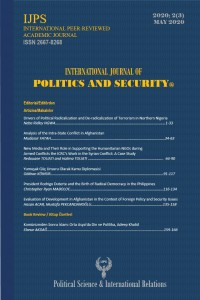Öz
Kaynakça
- Constantino, Renato. 1975. The Philippines: A Past Revisited. Manila: Tala Publications.
- Gaspar, Karl. 2018. “An Attempt at Dissecting the Presidency of Rodrigo Duterte.” In Social Ethics Society Journal of Applied Philosophy, Volume 4 (3): 1-30.
- Hotchcroft, Paul and Rocamora, Joel. 2003. “Strong Demands and Weak Institutions: The Origins and Evolution of Democratic Deficits in the Philippines.” Journal of East Asian Studies 3 (2): 259-292.
- Jaggar, Allyson. 2005. “What is Terrorism, why is it Wrong? And Could it ever be Morally Permissible?”. In Journal of Social Philosophy Volume 36, Number 2: 202-217.
- Mouffe, Chantal. 1995. “Liberalism and Modern Democracy.” in Democracy and Possessive Individualism. ed. Joseph Carens. New York: SUNY Press.
- Rafael, Vicente. 1988. Contracting Colonialism. Quezon City: Ateneo de Manila Press.
- Taylor, Graham. 2010. “The End of the Nation State: The Disarticulation of Power and Identity.” In The New Political Sociology. London: Palgrave Macmillan.
Öz
Abstract: In this paper, I examine the radical approach to politics of President Rodrigo Duterte. I will trace the roots of this radicalism to the colonial history of the Philippines in which the Spanish colonizers instituted an elitist democracy system that engendered a deep social divide that has made the people of Mindanao felt betrayed by the capital. This politics of exclusion also gave rise to terrorism in the Southern Part of the country, the latest incident of which was the crisis in Marawi that has left the city devastated to the ground. Political analysts have always criticized the president’s War on Drugs as anti-poor. However, Duterte has remained prominent due to his radical means toward governance. Previous administrations have been accused as lacking any political will. Duterte, on the other hand, has symbolized the strong will of a leader who possesses the charisma necessary to institute real change. But while this is the view of many, this investigation argues that the country must strengthen its political institutions in order to truly mature as a democracy.
Anahtar Kelimeler
Rodrigo Duterte Radical Democracy Nation-States War on Drugs
Kaynakça
- Constantino, Renato. 1975. The Philippines: A Past Revisited. Manila: Tala Publications.
- Gaspar, Karl. 2018. “An Attempt at Dissecting the Presidency of Rodrigo Duterte.” In Social Ethics Society Journal of Applied Philosophy, Volume 4 (3): 1-30.
- Hotchcroft, Paul and Rocamora, Joel. 2003. “Strong Demands and Weak Institutions: The Origins and Evolution of Democratic Deficits in the Philippines.” Journal of East Asian Studies 3 (2): 259-292.
- Jaggar, Allyson. 2005. “What is Terrorism, why is it Wrong? And Could it ever be Morally Permissible?”. In Journal of Social Philosophy Volume 36, Number 2: 202-217.
- Mouffe, Chantal. 1995. “Liberalism and Modern Democracy.” in Democracy and Possessive Individualism. ed. Joseph Carens. New York: SUNY Press.
- Rafael, Vicente. 1988. Contracting Colonialism. Quezon City: Ateneo de Manila Press.
- Taylor, Graham. 2010. “The End of the Nation State: The Disarticulation of Power and Identity.” In The New Political Sociology. London: Palgrave Macmillan.
Ayrıntılar
| Birincil Dil | İngilizce |
|---|---|
| Konular | Siyaset Bilimi |
| Bölüm | Makaleler |
| Yazarlar | |
| Yayımlanma Tarihi | 13 Mayıs 2020 |
| Gönderilme Tarihi | 9 Ocak 2020 |
| Kabul Tarihi | 7 Mayıs 2020 |
| Yayımlandığı Sayı | Yıl 2020 Cilt: 2 Sayı: 3 |
Veri Paylaşım Politikası
Bu dergi, yazarları bilimsel etik ve atıf kuralları ile kişisel hakların korunmasına yönelik evrensel ve yasal kriterler çerçevesinde kalırken araştırmaları sonucunda elde ettikleri verileri paylaşmaya teşvik etmektedir. Bu bağlamda IJPS, Budapeşte Açık Erişim Girişimi Deklarasyonunu (2001) benimser.

